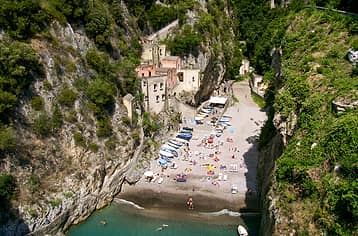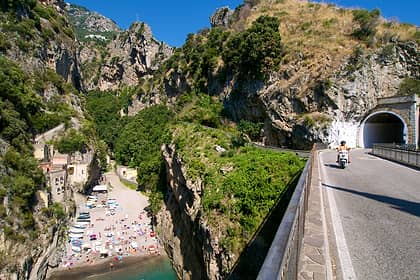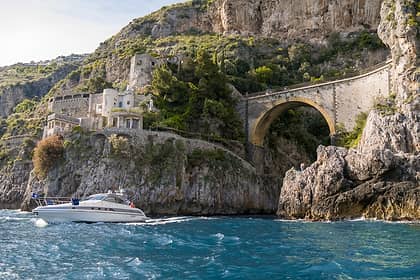Furore





Furore, the Amalfi Coast's Own Fjord
The "town that doesn't exist" and a fiord bang in the middle of Italy's Amalfi Coast.
The impressively named Furore ('Fury' in Italian), is often referred to as "the town that doesn't exist". In fact, unlike the great majority of small towns and villages in Italy, Furore has neither a main square nor a town center, consisting instead of a sprinkling of little cottages clinging to the rock face.
The name Furore comes from Terra Furoris, or 'land of fury', which dates back to the first settlers along this corner of the coastline who were struck by the roar of the waves that crash into the Fiordo di Furore (Fjord of Furore) during storms. In the past, the town was actually a small fortress inhabited by a handful of locals under the rule of nearby Amalfi. Thanks to its unique geographic position, the fortress was virtually impenetrable.
Roberto Rossellini filmed the second episode of his movie "L'Amore" here. During shooting, Rossellini and the leading female protagonist, Anna Magnani, became lovers and spent time in one of the town's "monazzeni" (fishing houses), "Villa della Storta", which the actress later purchased. Later, Rossellini fell in love with Ingrid Bergman, who was visiting the coast to shoot another part of the same film in Maiori.
How to Get to the Furore Fjord and Beach
How to Get to the Furore Fjord and Beach
To reach Furore, visitors must take Campania's coastal road which zigzags its way through the terraced vineyards and olive groves between Amalfi and Positano, not far from Conca dei Marini. At a certain point, the road plummets down towards the sea by way of a series of stomach-churning turns, seeming to end directly in the deep blue waters of the Fjord. A natural wonder normally associated with much more northern climes, the fiord was created by the passage of the Schiato torrent, the bed of which is now almost always dry. Beneath the bridge which spans the river, the Furore Fjord beckons with its tiny pebble beach and fishing hamlet, one of the most unique on the Amalfi Coast.
To reach the tiny beach nestled at the foot of the cliffs, you must climb down the 200 steps of the staircase that begins at the coastal highway above. There is a Sita bus stop on the bridge above that is part of the "Amalfi - Sorrento" route; if you are coming from Salerno, you need to change bus in Amalfi.
If you want to sunbathe and relax on the Furore Fjord beach, we suggest arriving first thing in the morning because the sun passes behind the cliffs in the early afternoon and the beach is in shade. The beach here is free and tends to get crowded, but there is a stand that rents sun loungers and beach umbrellas.
Parking in Furore
Parking in Furore

Parking at Furore is almost impossible. There is no street parking (either for vehicles or scooters), so the only nearby option is to park in one of the parking areas for the Euroconca or La Locanda del Fiordo restaurants and either have lunch or dinner there. The closest parking area to Furore is at Marina di Praia in Praiano, about two kilometers away. Otherwise, leave your car in Amalfi or Conca de Marini and take the bus to the Fjord.
What to See in Furore
What to See in Furore

On the beach, at the foot of the sheer cliffs, there are a number of recently restored "monazzeni", old sheds in which the fishermen used to store their tools and which, in the past, provided refuge for characters such as Ruggieri di Agerola, the legendary bandit cited in Boccaccio's Decameron.
Close to the "monazzeni" there is an old paper factory, complete with paper press and a mill, which houses Furore's Eco Museum and botanical garden.
One of the best ways to see the fjord and beach is with a boat tour, either from Naples, other towns on coast of the Campania region, or Capri.
Each year, on the first Sunday of July, the 30-meter high bridge which spans the fiord becomes the stage for the MarMeeting, world high diving championship. This thrilling event, in which divers plunge into the Mediterranean from great heights, can be watched from the Furore beach.
The murals of Furore
The murals of Furore
Some 3000 steps link the fjord with the houses of Furore, steps which, until the 1990s, provided the only connection between the area's high and low lands. These steps climb as high as Agerola, linking up with the Sentiero degli Dei.
Furore is a member of the Associazione Paesi Dipinti Italiani (Italian Association of Painted Towns) and the walls of its dwellings are decorated with the murals realized by artists of international renown.
Visitors should be sure to take a look at the 11th-century Church of San Giacomo Apostolo which houses a cycle of recently-discovered frescoes by the school of Giotto. Stop in at the Chiesa di San Michele, with its asymmetrical entrance, and the Chiesa di Sant'Elia, which is often studied by geologists because of its interesting stratifications. Like the entire Amalfi Coast, Furore is a UNESCO-listed World Heritage Site.
Where to Eat in Furore?
Where to Eat in Furore?
Fresh fish and seafood are the centerpieces of the authentic local dishes from this area. To sample traditional specialties, book a table at Hostaria Bacco Furore. For wine aficionados, the name Furore brings to mind the Marisa Cuomo winery, with its award-winning vintages. You can visit the winery and vineyards that climb the steep and narrow terraces and relax over a wine tasting.